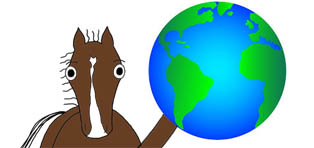June 22 2014
After a long weekend of endurance at Compiegne, France on May 23-25, five officiating endurance vets were left "tired, puzzled and bitter" after several unfavorable events occurred, among which were a photo of a "skeletal horse" that was allowed to compete that went viral, and a mare that died during the race.
While the event looked good on paper and appeared organized, late entries led to understaffing of officials, and the ground jury "had to cope with constant intense pressure from some competitors who constantly aim to appeal against judgments and try to cheat systematically." Treatment veterinarians also had to struggle with too many metabolic eliminations which required treatment.
"Our analysis of the reasons for this situation," the veterinarians wrote, "is that current practices of endurance in some group 7 countries is very far removed from the original spirit of our sport. These riders no longer follow the principle of making the most of the horse's performance on the day by listening to their mount, but push their horse beyond its capacity, which only a few of the best manage to tolerate the harmful effects. This kind of dangerous attitude goes beyond what actualy experienced vetgates and their team can cope with, and thus safety of the competing horses cannot be guaranteed anymore."
A large number of the treated horses recovered well, but a few who "were pushed too far" required further treatment. One of those horses, a mare who "developed a neurologic syndrome at the third vetgate" could not be saved by treatment and died.
These veterinarians have seen the progression of endurance racing in Europe from poorly ridden and managed horses, to "numerous elaborate and constantly evolving veterinary examinations at regular vetgates" which have improved the safety of the horses and awareness of the riders who have learned to take responsibility of their mounts, to a degradation of the sport where "jockeys" ride horses which they know nothing about, and doping agents "markedly mask typical symptoms of fatigue."
"At present, we are unfortunately faced with some riders who barely know their horses, do not respect them, and who are in the habit of cheating, lying and concealing information. In these conditions, 'modern' endurance cannot ensure the safety of horses and as practicing veterinarians we are faced with a situation we disapprove of, as well as the ineffectiveness or lack of real commitment from the FEI to solve this problem.
"These horses are put in grave danger by what we consider to be unethical and anti-sportive practices. Other riders and teams also disapprove of this situation which makes them cynical about the ethics of this competitive sport, and needs to be fought with great force."
These veterinarians recommend witness from outside endurance provide hindsight and objectivity to situations of abuse, and they call upon riders "to exert a respectful and ethical care upon riding their horses," and national and international organizations to implement strong measures to prevent abuse, particularly regarding doping.
The original letter went out in French on June 11, and has been officially translated. You can read the entire English version here:
http://www.endurance.net/international/UAE/2013FEIControversy/open_letter_to_endurance_June_2014_EnglishVersion.pdf
Gaucho Derby 2026 – Day 3 – Saddles Hot. Spirits Not.
Equestrianists.com - Full Story Stevie Delahunt 21st February 2026 Okay sports fans! It’s really shaping up to be a race today as riders...

-
Inside.fei.org 17 December 2020 The FEI Board took a series of key decisions on allocation, cancellation, and reopening of bids for FEI C...
-
Michael Pollard was one of the four winners of the 2025 Mongol Derby (Kathy Gabriel) Ca.News.yahoo.com - Full Article Annabel Grossman ...
-
BNA.bh - Full Article 17 Aug 2025 London, Aug. 17 (BNA): His Highness Shaikh Nasser bin Hamad Al Khalifa, Representative of His Majes...

